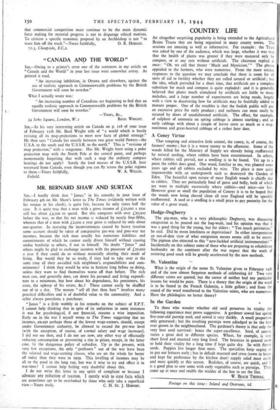COUNTRY. LIFE
AN altogether surprising popularity is being extended to the Agricultural Brains Trusts that are being organised in many county towns. The sessions are amusing as well as informative. For example: the Trust was asked by one of the audience, which was large, whether it was true that the health of plants was greater if they were manured only by compost, or at any rate without artificials. The chairman replied at once: "Oh. we call that theory 'Muck and Mysticism.'" The phrase appealed to the farmers, who were numerous. From the more serious responses to the question we may conclude that there is room for all sorts of aid to fertility whether they are called natural or artificial ; but the idea, which prevailed for a short time, that artificials are a complete .substitute for muck and compost is quite exploded: and it is generally believed that plants much stimulated by artificials are liable to many maladies, and a large number of experiments are being made, largely with a view to discovering how far artificials may be fruitfully added to manure proper. One of the troubles is that the foolish public will pay an excessive price for early produce ; and earliness can most easily be secured by doses of unadulterated artificials. The effect, for example. of sulphate of ammonia on spring cabbage is almost startling ; and an early cabbage with about a couple of leaves costs as much as a mag- nanimous and great-hearted cabbage of a rather later date.
A Coney Virtue That tempting and attractive little animal, the coney, is, of course, the farmers' enemy ; but it is a worse enemy to the afforester. Some of the woods felled for the Ministry of Supply are already being reafforested by natural seeding, where rabbits have been exterminated. In others, where rabbits still prevail, not a seedling is to be found. Yet up to a point the rabbit does good. One wood, familiar to me, was planted some years ago and all rabbits excluded by wire. The place is now quite impenetrable with an undergrowth such as destroyed the Garden of Eden. The beautiful open nature of most English woods is chiefly due to rabbits. They are particularly fond of gorse and holly, both of which are wont to multiply excessively where rabbits—and mice—are few. However great or small the population of Coneys it is to be hoped that the woods now being shaved clean all over England will be speedily reafforested. A seed or a seedling is a small price to pay posterity for the value of a great trunk.
Hodge -Dogberry The pig-man, who is a very philosophic Dogberry, was discussing emigration as he poured out the hog-wash, 'and his opinion was that it was a good thing for the young, but for elders: "Too much privitation," he said. Did he mean loneliness or deprivation? In either interpretation an out-of-date view of what emigration means seems still to be extant. The pigman also objected to this " new-fackled artificial insimmeration! " Incidentally on this subject some of those who are preparing to rehabilitate husbandry on the continent after the war expect that the work of restoring good stock will be greatly accelerated by the new methods.
St. Valentine What is the origin of the name St. Valentine given to February 14th and of the now almost forgotten methods of celebrating it? Two very different saints. are quoted, but the career of neither had any particular lessons for would-be pairs. There is a theory that the origin of the word is to be found in the French Galentin, a little gallant ; and from the sound of the word transferred to the Valentine saints, who are numerous. Have the philologists no better theory?
In the Garden • To those who wonder whether old seed preserves its vitality the following experience may prove suggestive. A gardener sowed last spring five-year-old parsnip seed, and sowed it very thickly. A small proportion only generated ; but the resulting parsnips were adjudged to be the best ever grown in the neighbourhood. The gardener's theory is that only the very best seed survived: hence the super-excellence. Seed, of coune. varies a great deal in different species. Wheat, for example, is very short lived and mustard very long lived. The brassicas in general seem to hold their vitality for a long time if kept quite dry. So with flowe seeds. Poppies live longer than most. The specialists keep urging u, to put out lettuces early ; but in default mustard and cress (sown in boxes and kept for preference by the kitchen door) supply salad most easily and most quickly at this season. Radishes, of course, are quick, and i! is a good plan to sow some with early vegetables such as parsnips. They come up at once and enable the wielder of the hoe to see the line.
W. BEACH THOMAS.
Postage on this issue : Inland and Overseas, id.


























 Previous page
Previous page